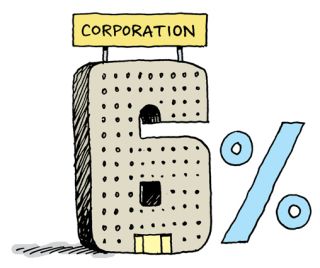Time to reform Corporation Taxation and Subsidies

Budget 2020 is the ideal time to reform how Ireland does corporate taxation. At present, too many firms get away with paying low effective rates or availing of overly generous subsidies or tax holidays. Our Budget 2020 submission, published in June, contains numerous proposals to improve matters.
Introduce a Minimum Effective Corporate Tax Rate
The adequacy and fairness of corporate tax payments has been a recurring issues for a number of years. Despite a low headline rate (12.5%), there is limited data on the effective rate of corporate taxation in Ireland.
A recent report from the Comptroller and Auditor General (C&AG) shed new light on this sector. Using the approach used by the Revenue Commissioners to calculate the effective tax rate (tax due as a % of taxable income) they found an overall effective corporation tax rate of 9.8% in 2016. Among the top 100 corporate tax payers, who account for 70% of tax paid, 8 had a 0% or less rate, 5 paid between 0% and 1%, 1 paid between 1% and 5%, 7 paid between 5% and 10%, while the remainder (79 firms) paid more than 10%. It is clear that a small number of very large firms are at the core of the tax adequacy issues in this sector.
Social Justice Ireland believes that the issue of corporate tax contributions is principally one of fairness. Profitable firms with substantial income should make a contribution to society rather than pursue various schemes and methods to avoid these contributions.
Proposal: Introduce an effective corporation tax rate of 6%. This would yield in excess of €1,000m in 2020.
Limit the ability to carry losses forward
Government should reform the tax laws so that limits are placed on the ability of individuals and corporations to carry past losses forward and offset these against current profits/income. While there is merit in having some period available to carry losses, to reflect the choices and operating decisions of business and other short-term effects, there is no merit in these continuing indefinitely as is currently the case. We suggest introducing a rolling limit of 10 years on these losses commencing from midnight of the day Budget 2020 is announced. Losses prior to this period would no longer be available to offset against profits or capital gains. The 50% annual cap should also be reintroduced
While this initiative would bring greater fairness to the overall taxation system, we note it would have a disproportionate effect on banking institutions who carry significant, self-inflicted, losses from the economic crisis a decade ago. Consequently, we suggest that Budget 2020 would also amend the current banking levy, reducing it by 50%, as a means of partially offsetting this effect for banks.
Proposal: Limit the ability of individuals and corporations to carry losses forward to 10 years; and halve the banking levy. This would yield €100m in 2020.
Abolish the Special Assignee Relief Programme (SARP)
The SARP was introduced in 2014 to provide a tax reduction to high earning individuals who locate to Ireland for work purposes (generally in MNCs in the IT and financial sector). Recipients must earn between €75,000 and €1m. Qualifying employees with income above €75,000 receive a reduction in their income tax liability. This subsidy was intended to boost the attractiveness of Ireland for foreign investment; however there is no evidence to suggest the scheme has achieved this or that it has induced any recent investment and relocations that would not have otherwise occurred. Abolishing this scheme would also make the tax system fairer.
Proposal: Abolish SARP to yield €18m in 2020.
Reform the R&D tax credit
A tax break for companies engaged in research and development was introduced in 1997 and has been revised and reformed on a number of occasions since.
A curious component of the current structure is that firms may claim a tax refund on unused R&D credits - i.e. where they have not paid tax to cover the refund amount. The use of this scheme has allowed a number of profitable firms to record zero or negative (refund) tax paid amounts over recent years. A reform to this refund structure is overdue and it should be removed from the structure of this tax break in Budget 2020.
Proposal: Remove the tax refund element for unused R&D tax credits. This would yield €150m in 2020.
Increase the National Training Fund Levy
A recommendation of the Cassells Report on the future funding of higher education was that employers should make greater contributions to the cost of the higher education sector - given the benefits they receive from those educated by that sector. The report recommended that the National Training Fund Levy paid by employers be gradually increased to 1% by 2020 and that the fund be reformed to provide greater support for programmes in higher education. Budget 2018 commenced this process with a 0.1% increase and Budget 2019 did the same. We recommend that Budget 2020 completes this process and increases the levy from 0.9% to 1%.
Proposal: Increase the National Training Fund Levy to 1%. This would yield €74m in 2020.